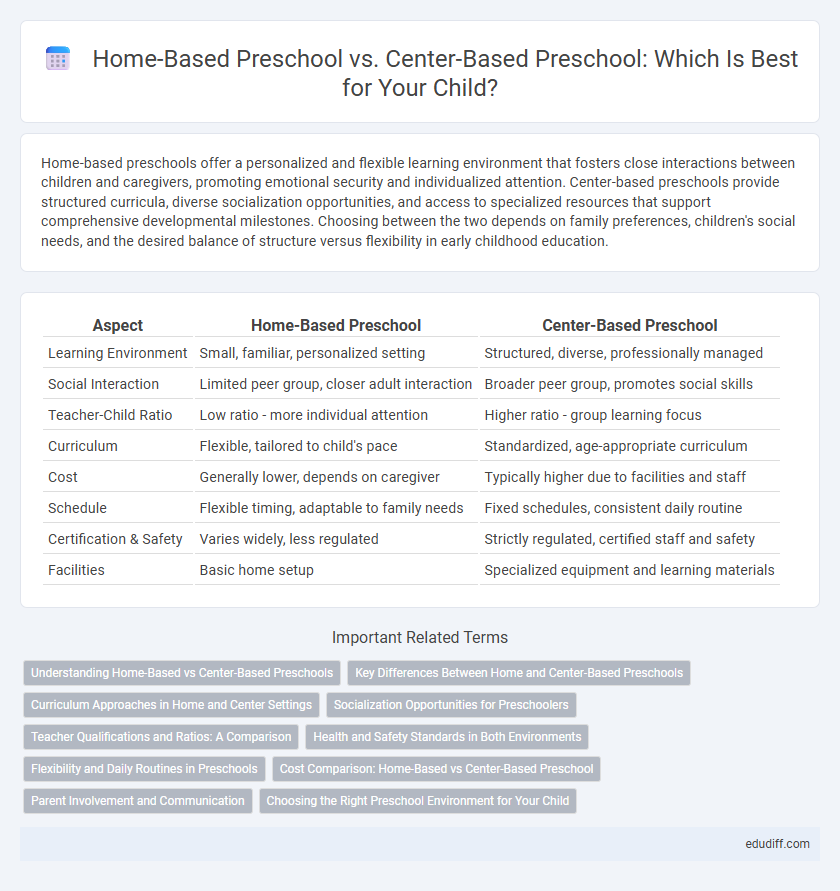Home-based preschools offer a personalized and flexible learning environment that fosters close interactions between children and caregivers, promoting emotional security and individualized attention. Center-based preschools provide structured curricula, diverse socialization opportunities, and access to specialized resources that support comprehensive developmental milestones. Choosing between the two depends on family preferences, children's social needs, and the desired balance of structure versus flexibility in early childhood education.
Table of Comparison
| Aspect | Home-Based Preschool | Center-Based Preschool |
|---|---|---|
| Learning Environment | Small, familiar, personalized setting | Structured, diverse, professionally managed |
| Social Interaction | Limited peer group, closer adult interaction | Broader peer group, promotes social skills |
| Teacher-Child Ratio | Low ratio - more individual attention | Higher ratio - group learning focus |
| Curriculum | Flexible, tailored to child's pace | Standardized, age-appropriate curriculum |
| Cost | Generally lower, depends on caregiver | Typically higher due to facilities and staff |
| Schedule | Flexible timing, adaptable to family needs | Fixed schedules, consistent daily routine |
| Certification & Safety | Varies widely, less regulated | Strictly regulated, certified staff and safety |
| Facilities | Basic home setup | Specialized equipment and learning materials |
Understanding Home-Based vs Center-Based Preschools
Home-based preschools offer personalized, nurturing environments where children benefit from smaller class sizes and flexible scheduling, fostering close caregiver-child relationships crucial for early development. Center-based preschools provide structured curricula, socialization opportunities with larger peer groups, and access to specialized resources and trained educators that support comprehensive early learning. Choosing between home-based and center-based settings depends on individual child needs, family preferences, and the importance placed on educational structure versus intimate care.
Key Differences Between Home and Center-Based Preschools
Home-based preschools offer personalized attention in a familiar environment, promoting comfort and individual learning paces, while center-based preschools provide structured curricula and socialization opportunities with diverse peer groups. Staffing in home-based settings typically involves fewer educators, often a single caregiver, compared to certified teachers in center-based programs, which ensures professional educational standards and regulatory compliance. Moreover, home-based preschools usually operate with flexible schedules but limited resources, whereas center-based preschools offer extensive facilities, including playgrounds and specialized learning materials, enhancing developmental activities.
Curriculum Approaches in Home and Center Settings
Home-based preschools often utilize personalized, play-based curriculum approaches tailored to individual child interests and family values, promoting a flexible learning environment. Center-based preschools typically follow structured, research-backed curricula such as Montessori, Reggio Emilia, or HighScope, emphasizing group activities and social development. Both settings integrate developmental milestones, but center-based programs prioritize standardized assessments and collaborative learning experiences.
Socialization Opportunities for Preschoolers
Home-based preschools offer personalized socialization opportunities in a familiar environment, promoting close interactions with a small peer group and caregivers. Center-based preschools provide diverse social experiences through structured group activities and exposure to a wider range of children, fostering adaptability and cooperative skills. Both settings contribute uniquely to early childhood social development, with the choice often depending on the child's temperament and social needs.
Teacher Qualifications and Ratios: A Comparison
Teacher qualifications in home-based preschools often vary, with some providers holding formal early childhood education certifications while others may have limited training, impacting curriculum quality and child development. Center-based preschools typically employ certified early childhood educators who meet state licensing requirements, ensuring consistent educational standards. Child-to-teacher ratios are generally lower in center-based settings, facilitating better supervision and individualized attention compared to many home-based programs where higher ratios may be common due to fewer staff members.
Health and Safety Standards in Both Environments
Home-based preschools often provide a personalized environment with flexible health and safety measures tailored to a smaller group, while center-based preschools adhere to standardized regulations enforced by local authorities to ensure consistent sanitation, supervision, and emergency protocols. Both settings must comply with state licensing requirements, but center-based preschools typically have dedicated staff trained in first aid and CPR, regular health inspections, and structured routines to minimize illness and injury risks. Parents should evaluate each option's adherence to vaccination policies, hygiene practices, and facility safety features when choosing the best preschool environment.
Flexibility and Daily Routines in Preschools
Home-based preschools offer greater flexibility in daily routines, allowing parents to tailor schedules and activities to fit their child's individual needs and family lifestyle. Center-based preschools follow structured routines designed by educational professionals, promoting consistency and social interaction among children. Both models support early childhood development, but home-based settings often afford personalized attention, while centers provide regulated environments and diverse group dynamics.
Cost Comparison: Home-Based vs Center-Based Preschool
Home-based preschools generally offer lower tuition fees, averaging between $200 to $400 per month, compared to center-based programs which can range from $500 to over $1,000 monthly depending on location and facilities. Additional costs in center-based preschools may include registration fees, supplies, and extracurricular activities, contributing to overall higher expenses. Families prioritizing affordability often choose home-based preschools due to smaller class sizes and personalized care at a reduced cost.
Parent Involvement and Communication
Home-based preschools foster higher levels of parent involvement through daily, personalized interactions and flexible communication tailored to family routines. Center-based preschools offer structured communication channels such as newsletters, parent-teacher conferences, and scheduled events to facilitate ongoing engagement. Effective collaboration between parents and educators in both settings significantly enhances children's developmental outcomes and social-emotional growth.
Choosing the Right Preschool Environment for Your Child
Choosing the right preschool environment depends on your child's learning style, social needs, and family schedule. Home-based preschools offer personalized attention, a flexible daily routine, and a familiar setting that supports your child's emotional comfort. Center-based preschools provide structured curricula, group activities for social development, and access to specialized resources that enhance early childhood education.
Home-based preschool vs Center-based preschool Infographic

 edudiff.com
edudiff.com